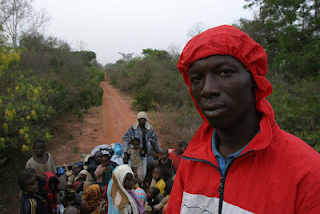One in Six People in Sudan is Homeless
Picture your home like your cozy nest, where you feel safe and comfortable, surrounded by your family and all your favorite things. Now, think about being told that you have to leave that nest and go somewhere else because of something like a war, gangs, or hunger that makes it impossible to stay there. Being displaced from home means having to leave your nest suddenly and being unable to return for a while. Just like when you go on a trip and miss your bed, being displaced means not having your home, toys, or friends nearby. You have to stay in a different place, maybe with relatives, friends, or a particular shelter such as a displaced persons camp, until it's safe to return home.
One in Six People in Sudan is Homeless
Sudan is home to a population of 48.6 million, however, since April 2023, 7.7 million people have been displaced both inside and outside of Sudan due to safety concerns. To put it in simpler terms, it's like a playground where some kids can't play anymore because it's no longer safe. In this case, the 7.7 million people had to leave their homes due to a big fight or some other scary event that made it too dangerous for them to stay.
Suppose you couldn't go back to your cozy room with your bed, toys, and all the things you love. Instead, you had to wander around, not knowing where you'd sleep tonight or if you'd have enough to eat. You wouldn't have a school to go to or friends to play with nearby. Being homeless in Sudan is kind of like that. It means many parents and kids there don't have a safe place to call home.
Economic Crisis in Sudan Effects on Daily Life
Things in Sudan are getting really bad. There's been a lot of fighting since April 2023, and it's causing big problems. More and more people don't have enough food to eat. In fact, the number of people who can't get enough food has gone up a lot since 2019. Now, there are almost 18 million people who don't have enough to eat, and nearly 5 million of them are in really bad shape.
Why is this happening? Well, the fighting is making it hard for people to grow food or get to the stores to buy it. Prices for food, gas, and other stuff we need are going way up, and there's not enough food being grown to go around. Because of all this fighting, millions of people have had to leave their homes. Can you imagine having to leave your house because it's not safe anymore?
It's making things even harder because there are now more people needing help, and there's not enough to go around. The fighting is also messing up the banks, which means people can't get the money they need to buy things. Everything is getting more expensive, and it's really tough for people who don't have much money.
Being homeless in Sudan is tough.
Kids and adults have to sleep in crowded shelters, on the streets, or even in makeshift tents. They do not have enough food to eat every day, and they might miss out on going to school because they're too busy trying to survive. Now, imagine if that happened to kids here in the USA. It would mean they couldn't go back to their warm beds or have the security of a home. They would feel scared, lonely, and uncertain about the future, just like kids who are homeless in Sudan. As a result, they were forced to seek refuge either within Sudan or in other countries. Despite its large, clever population, Sudan has faced many safety concerns that have resulted in people having to leave their homes to ensure their safety.
Things to do to help Sudan's Homeless Displaced Kids
Three things to do to help homeless kids in Sudan are creating awareness campaigns, letter-writing campaigns, and art projects.
Awareness campaigns will help raise awareness about the situation in Sudan. Creating posters or presentations with facts, photos, and stories will help educate classmates, teachers, and family members. Kids become more aware of the world around them, including issues such as poverty, homelessness, or refugee crises, which may not directly affect their lives.
Letter-writing campaigns empower kids to take action and advocate for causes they believe in. Write letters or create cards with messages of support and encouragement for children and families affected by the crisis in Sudan. Send these to local charities or organizations working on the ground to distribute to those in need.
Art Projects about Sudan have the ability to influence change through advocacy. Create artwork inspired by the people, culture, or landscape of Sudan to raise awareness and promote empathy. Display your artwork at school or in your community to spark conversations about the crisis. Art projects help kids understand that they are part of a larger community that extends beyond their immediate surroundings, and they have the power to make a positive impact on the lives of others, regardless of geographical boundaries.


